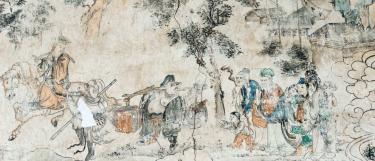
Buddhist Studies
Buddhism has arguably always been transcultural from the ground up, and problematics that call for a transcultural approach abound throughout its long history. Buddhist Studies at Heidelberg accordingly focuses on the study of historical Buddhisms in a transcultural perspective. We teach mainly at graduate level, and welcome MA and PhD applications on a broad range of topics. Through happenstance of faculty expertise, our program focuses on texts, philology, translation, doctrine and ideas; and on the transculturation of Buddhism in China in particular. However, we approach these topics with a systematic attention to their embedding and interrelation with other dimensions of the tradition and its history. Our students also benefit from the remarkable strengths of Heidelberg faculty beyond HCTS in numerous other aspects of Buddhist Studies, including Art History, Religious Studies (social-scientific) approaches, and archaeology; and the Buddhisms of Japan, India, Nepal, Sri Lanka, and more.
Research
The study of texts and ideas, and their history; Mahāyāna Buddhism; Buddhism in China; computational philological tools and methods in Buddhist textual studies; transculturation of Buddhism. Current DFG-funded projects research the translation corpora of *Dharmarakṣa 竺法護 (3c) and Paramārtha 真諦 (6c). We are also closely associated with the Heidelberg Academy project on sūtras carved in stone in China (see links on the right). Doctoral researchers work on topics such Chinese Abhidharma, the transculturation of the Buddhist pantheon, a Mongolian repentance text, theory of mind, and the blurry boundary between sūtra translation and composition.
Studies
Thematic courses address topics in Buddhism on the basis of secondary scholarship, with an emphasis on transculturation (past examples: meditation, Pure Land, early Mahāyāna, Buddhist philosophy). Specialist Buddhist Studies courses focus on close reading of primary Buddhist texts in Chinese, Sanskrit, and Tibetan (occasionally other languages). Language courses cover introductions to classical Buddhist Tibetan, Chinese, Sanskrit, and Mongolian. Buddhist Studies faculty also teach into curricula in the South Asia Institute and Sinology. In collaboration with SAI, we also offer the biannual lecture series "Introduction to Buddhist Studies".






